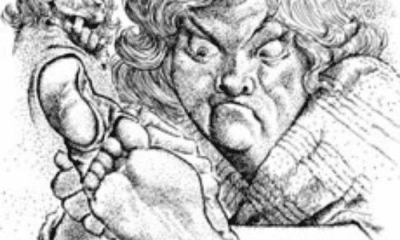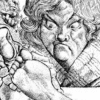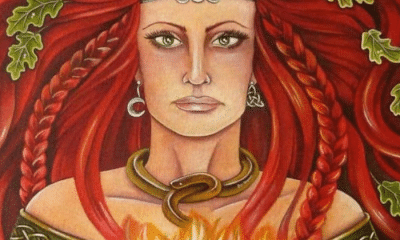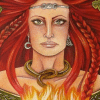Ceridwen: The Welsh Sorceress
The sorceress Ceridwen had a minor but important role in Welsh legends. Keep reading to find out how an enchantress gave power to the most legendary bard in Britain!
Ceridwen has been interpreted as a Celtic goddess of poetry, rebirth, or wisdom. Many scholars, however, believe that the full story of Ceridwen might not be an ancient Celtic myth at all.
Her most well-known and detailed appearance is in the Tale of Taliesin, written in the 15th century. While it is based on earlier legends of the famous bard, many changes were made to fit the attitudes and fashions of the late Middle Ages.
In that story, Ceridwen is an enchantress who, trying to give her ugly son an advantage in life, brews a powerful potion of wisdom. A simply mistake, however, results in the potion being consumed by someone other than the intended user.
What follows is a brief but exciting story of shapeshifting, chases, rebirth, and an orphan set adrift at sea. Through this unusual series of events, Ceridwen became the mother of Taliesin, the legendary poet of Wales.
Is the story of Ceridwen really so unusual, though? While it may not have been an ancient tale, the strange legend of how Taliesin got his gifts has all the elements of a classical myth.
The Legend of Ceridwen’s Potion
In the legends of medieval Wales, Ceridwen is a powerful sorceress.
The account of her legend appears in the medieval Tale of Taliesin. While the poet was said to have lived in the 6th century, the Tale of Taliesin was not written until nearly a thousand years later, in the middle of the 16th century.
This medieval romance says that Ceridwen and her family lived near Bala Lake in Gwynedd. She and her husband, Tegid Foel, had a son and a daughter.
Their daughter, Creirwy, was well-loved by her mother. She was was one of the three most beautiful girls in all of Britain.
Ceridwen had less love for her son, however. Morfran, who is also called Afagddu, was so hideous that she could barely stand to look at him.
Ceridwen still loved her son, however, and hoped to give him another gift since he did not have his sister’s beauty.
The enchantress had a magical cauldron. She decided to brew Morfran a potion that would give him wisdom and poetic inspiration beyond all other men, called Awen in Welsh.
The potion of Awen had to be brewed for a full year. Ceridwen hired a blind man called Morda to tend the fire beneath it and a boy named Gwion Bach to constantly stir the liquid.
The attendants were warned to take great care with their work. While the first three drops of the cauldron’s contents would make Morfran wise, the rest was a fatal poison that could kill a person in moments.
Gwion Bach, however, was careless and fell asleep as he worked one day. A few drops of the potion splashed onto his thumb.
The hot liquid woke Gwion Bach from his sleep and he instinctively put his thumb in his mouth to soothe the burn. In doing so, he drank the three drops of potion meant for Ceridwen’s son.
Known the sorceress would be angry, Gwion Bach fled from Bala Lake. Ceridwen, however, soon learned what had happened and gave chase.
Using the new wisdom that the potion had given him, Gwion Bach shapeshifted into a hare. Ceridwen became a greyhound to outrun him.
He became a fish and jumped to a river to swim away. She became an otter and tried to grab him out of the water.
When Gwion Back turned into a bird to escape by air, Ceridwen dove after him as a hawk.
Finally, Gwion Bach tried to hide as a tiny grain of corn. Ceridwen, however, transformed herself into a hen and swallowed the grain.
The potion had given Gwion Bach such great powers, however, that he did not die.
Ceridwen soon realized that she was pregnant. Knowing that the child she carried was the reincarnation of Gwion Bach, she decided to kill him as soon as he was born.
When the time came, however, Ceridwen could not bring herself to take the newborn’s life. He was too beautiful to harm.
Instead, she placed him in a coracle and set him adrift in the ocean. Although she did not want him to survive, she could not hurt him herself.
Prince Elffin ap Gwyddno found the infant off the shore near Aberdyfi. He adopted the child and named him Taliesin, the legendary barb of Wales.
Morfran did not get the potion of Awen, but he made his way in the world nonetheless. He became one of King Arthur’s warriors and, according to one legend, survived the Battle of Camlann because he was so hideous that the enemy fighters thought he was an unkillable devil.
My Modern Interpretation
Because Ceridwen’s legend was written at such a late date, it is difficult to tell how far back the story goes.
Earlier stories inspired by Taliesin sometimes mention the enchantress by name, but no details of her role in the tale survive.
Based on the style of the text, many historians believe that the Tale of Taliesin is based on a 9th century poem. Even then, however, they think that some elements of the story may have been changed and expanded on by later writers.
Ceridwen’s cauldron appears in some of these earlier sources, but no details survive regarding what may have been brewed in it. Most historians believe that she appears as a sorceress in earlier works, but that her role as the creator of Taliesin’s poetic abilities was an invention of the Middle Ages.
If this is the case, the tale does not reflect early Welsh mythology. While Taliesin is a central figure in many early medieval Welsh legends, the story of Ceridwen’s potion does little to shed light on ancient Welsh beliefs.
It can, however, give clues as to how the Welsh writers of the late Middle Ages viewed their tradition.
While Ceridwen’s story is likely not entirely rooting in Welsh mythology, it does have parallels to many myths from other cultures. This does not show early influence on Wales, but the influences that other stories had on later writers.
Awen, for example, is a concept that is well-established in Welsh culture. Its distillation into a potion, however, is not seen in other legends.
Ceridwen’s brew may be inspired by the Norse myths as they were written by authors of the 13th century. Odin’s Mead of Poetry is another magical concoction from a powerful cauldron that had the power to grant poetic inspiration.
Gwion Bach sucking the potion off his thumb is likely taken from a 12th century legend of Fionn mac Cumhail’s childhood. In an almost identical story, the Irish hero sucks the juice of the Salmon of Knowledge from his finger and gained its wisdom instead of its intended recipient.
The shapeshifting chase scene occurs in many myths. Norse and Irish myths both use the motif when tricksters escape danger, and the Greek goddesses often used similar tactics to escape unwanted suitors.
Similarly, pregnancy from eating a seed or insect is another common theme in well-known religions. Etain is reborn in this way in Irish mythology, some Greek stories claimed Dionysus was born from a seed, and Athena was born because her mother was swallowed.
The story of the baby set adrift at sea is common, as well. The inspiration could be the infancy of Perseus, but a medieval writer would have also been very aware of the Biblical story of Moses.
While many of these inspirations come from ancient Greece or further afield, many are from other Celtic cultures, specifically Ireland.
This may be seen as evidence that, even if Ceridwen’s story was not an original myth, an effort was made to make the story keep the themes and tone of other Celtic legends.
In Summary
Ceridwen is mentioned in several medieval Welsh poems, but a full story does not survive until the 15th century Tale of Taliesin.
In this story, likely based in part on classical legends, she is a powerful enchantress. Using a magical cauldron, she brews a potion to grant her son wisdom and poetic inspiration to compensate for his hideous appearance.
Instead, the three drops that grant such gifts are accidentally ingested by a young servant who assists her. He flees, shapeshifting into many different animals to outrun Ceridwen.
She catches him, however, when he tries to hide as a grain of corn. She turns into a hen and eats him, but becomes pregnant as a result.
Knowing the child is the reincarnation of the boy she chased, Ceridwen vows to kill him. He is too beautiful to harm, however, so she sets him adrift at sea.
The baby is rescued by a prince. He grows up to be Taliesin, Welsh history’s most renowned poet and bard.
Most scholars think that Ceridwen’s role in the story was made up, or at least highly expanded, by later medieval writers. It is obvious, however, that this invention was inspired by a knowledge of other myths.
The story of Ceridwen reflects themes from Irish, Norse, Greek, and other influences. This shows that, even if she was not an existing goddess of poetry, Ceridwen was written to fit into the style and themes of Celtic mythology.









